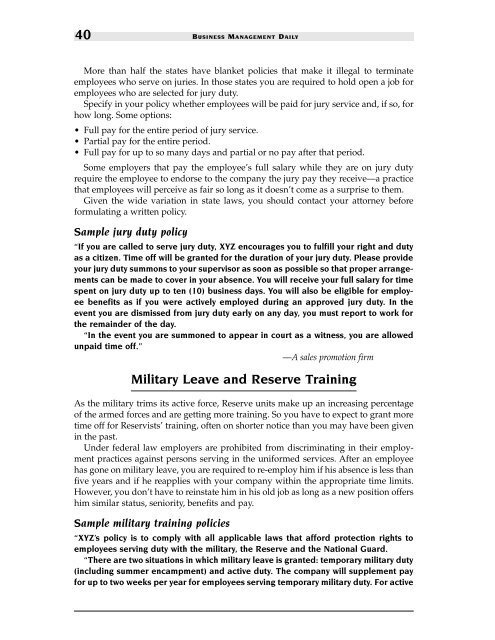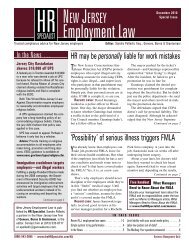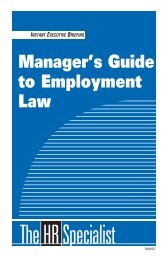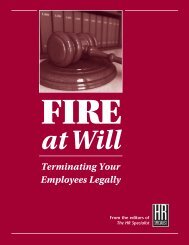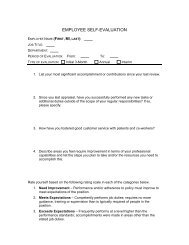sample policies
sample policies
sample policies
Create successful ePaper yourself
Turn your PDF publications into a flip-book with our unique Google optimized e-Paper software.
40 BUSINESS MANAGEMENT DAILY<br />
More than half the states have blanket <strong>policies</strong> that make it illegal to terminate<br />
employees who serve on juries. In those states you are required to hold open a job for<br />
employees who are selected for jury duty.<br />
Specify in your policy whether employees will be paid for jury service and, if so, for<br />
how long. Some options:<br />
• Full pay for the entire period of jury service.<br />
• Partial pay for the entire period.<br />
• Full pay for up to so many days and partial or no pay after that period.<br />
Some employers that pay the employee’s full salary while they are on jury duty<br />
require the employee to endorse to the company the jury pay they receive—a practice<br />
that employees will perceive as fair so long as it doesn’t come as a surprise to them.<br />
Given the wide variation in state laws, you should contact your attorney before<br />
formulating a written policy.<br />
Sample jury duty policy<br />
“If you are called to serve jury duty, XYZ encourages you to fulfill your right and duty<br />
as a citizen. Time off will be granted for the duration of your jury duty. Please provide<br />
your jury duty summons to your supervisor as soon as possible so that proper arrangements<br />
can be made to cover in your absence. You will receive your full salary for time<br />
spent on jury duty up to ten (10) business days. You will also be eligible for employee<br />
benefits as if you were actively employed during an approved jury duty. In the<br />
event you are dismissed from jury duty early on any day, you must report to work for<br />
the remainder of the day.<br />
“In the event you are summoned to appear in court as a witness, you are allowed<br />
unpaid time off.”<br />
—A sales promotion firm<br />
Military Leave and Reserve Training<br />
As the military trims its active force, Reserve units make up an increasing percentage<br />
of the armed forces and are getting more training. So you have to expect to grant more<br />
time off for Reservists’ training, often on shorter notice than you may have been given<br />
in the past.<br />
Under federal law employers are prohibited from discriminating in their employment<br />
practices against persons serving in the uniformed services. After an employee<br />
has gone on military leave, you are required to re-employ him if his absence is less than<br />
five years and if he reapplies with your company within the appropriate time limits.<br />
However, you don’t have to reinstate him in his old job as long as a new position offers<br />
him similar status, seniority, benefits and pay.<br />
Sample military training <strong>policies</strong><br />
“XYZ’s policy is to comply with all applicable laws that afford protection rights to<br />
employees serving duty with the military, the Reserve and the National Guard.<br />
“There are two situations in which military leave is granted: temporary military duty<br />
(including summer encampment) and active duty. The company will supplement pay<br />
for up to two weeks per year for employees serving temporary military duty. For active


